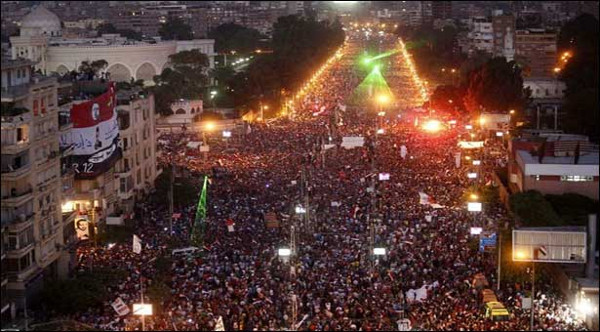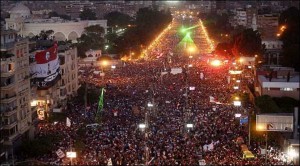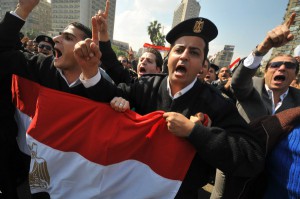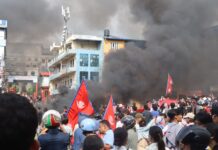The revolution must continue! For a government of workers and the poor!
Aysha Zaki, CWI
During the last week of tumultous events in Egypt, Aysha Zaki has discussed with socialist opposition activists in Cairo about the mass movement to the rule of the Muslim Brotherhood, the military take-over, the workers’ movement and the main tasks facing socialists. The following article is based on these discussions.
The last week has seen one of the biggest mass revolutionary demonstrations in human history. The 30th June mass uprising in Egypt was a continuation of the 25th January (2011) revolution for “bread, liberty and social justice”. Within three days, 20-25 million people were mobilized in the streets, ‘Revolutionary Popular Committees’ were re-launched, and three industrial cities declared civil disobedience and hundreds of independent unions called for a general strike.
The military tops stepping in and removing the Muslim Brotherhood’s (MB) Morsi from the presidency was both aimed at removing a rival grouping and a conscious act to prevent organized workers from taking the political struggle into their workplaces and stepping into the revolutionary scene. The strength of the mass opposition to Morsi has mean that, for now, the military tops do not want to appear that they have taken power on their own but are prepared to share power with pro-capitalist leaders associated with their opposition to Morsi.
Interim government
The first figures put forward for an interim government were pro-capitalist liberals and religious leaders. Al Baradei, a neo-liberal politician and former head of the UN’s nuclear watchdog, was one of those named for interim prime minister. This was immediately met with opposition from the far-right Salafist Nour party. Nour party leaders had participated in the post-Morsi ‘road map’ talks with the army but have now threatened to withdraw.
Different activist and social media groups in Egypt have reported that Nour Party members have been involved in the pro-Morsi protests while their leaders were sitting with the army tops discussing the road map. This bears with it two indications; the leadership is detached from the rank and file, and / or wants to use the street protests to pressurise the military tops into guaranteeing them a place in the interim government, while staying on good terms with the MB supporters to win over their support in the elections. The Nour party is clearly trying to portray itself as an alternative to the widely hated and discredited MB.
Right-wing Islamist reaction
Hundreds of thousands of Morsi supporters have been protesting, with a number clashing with the army and others with Morsi opponents. Dozens have been killed and hundreds injured in less than a week. Activists in Egypt reported that during the first confrontations between protestors, the army only stepped in when the fighting was over. And other reports soon followed about the army tops entering talks with some MB leaders to involve them in the new government – a signal of a possible split in the MB party.
Since the removal of Morsi, MB leaders and followers have repeatedly said they would remain in the streets until Morsi is restored to office, and pro-Morsi clerics have been using sectarian agitation which has resulted in attacks on youth activists and ordinary people. Islamist far-right thugs have been filmed carrying Al-Qaeda flags on protests, attacking and abusing unarmed youth protestors and women. The day that Salafist clerics started speaking of “martyrs of legitimacy”, a horrific video was posted on Youtube and facebook showing Al-Qaeda and Salafist thugs beating and throwing teenagers from a roof.
The whipping up of reactionary ideas has also been reflected in the increasing number and brutality of group rapes and sex violence targetting female protestors all across Egypt but especially in Cairo. On the night of the 30 June, over 100 cases of sexual assault were reported only in Tahrir Square! These sexist and reactionary methods have been used in Egypt against female activists by thugs under Mubarak, during the military rule and under Morsi. The police was even reported last week to have carried out ‘virginity tests’ on victims of rape, on the night of the removal of Morsi!
A ‘coup’ or a ‘revolution’?
When Obama expressed “concern about the violence in Egypt” after the army intervention last week, the response from a layer of workers and youth was to demand an end to imperialist interference (referring to the US support of Morsi over the past year) and to state that the 30th June events were a “people’s revolution” or a “people’s coup”. While the mood among the increasingly confident Egyptian youth and workers is growing in confidence, the Left has a responsibility to warn that there is nothing progressive about the role of the military tops. The army felt compelled to take action – even had it imposed on it – to head off and to try to derail and contain the mass movement of tens of millions. At the same time, it seems clear that at least parts of the military tops were meeting with some of the anti-Morsi leaders before his overthrow. The military wanted both to exploit and try to control the movement. In this, they were only acting in their own interests and as a part of the ruling classes defending the existing system. It is worth remembering that the Egyptian army is the second most US-backed army in the region, second to the Israeli army!
However, when socialists warn about the consequences of the military intervention, it is different to the MB supporters’ description of it as a “coup against the legitimacy of the elections”. The MB only refers to their ‘right’ to continue ruling in an authoritarian manner, imposing neo-liberal policies. They completely disregard the fact that the coup was forced on the army tops after upwards of 20 million people took to the streets calling for Morsi to step down and threatened to go further and to topple the whole rotten establishment.
The army chiefs, which control whole industries and up to 40% of the Egyptian economy, have now seized direct control of the state apparatus. The military tops have declared that it will “protect the achievements and aspirations of the great people of Egypt, at any cost”. But the military will be used to attack workers if the ruling class is confronted by striking workplaces – as seen, and reported on by CWI members, during the height of the strike movement in February 2011.
Over the last two and half years, strikes and workers protests across the public and private sectors have been breaking out all across the country, with the most common demands being the removal of owners, managers, security chiefs and corrupt trade union leaders. Workers have come into conflict with big business owners, remnants of Mubarak regime, and MB backers, in their fight for better wages and conditions.
Hundreds of independent trade unions have been established in workplaces and across key sectors. The difference in the revolutionary process today is the immense scale of the protests and the confident and radicalized mood across the working class and poor masses in society.
What the ruling classes regionally and internationally mostly fear is the dominant mood in the streets for the revolution to continue and the confidence expressed by workers and youth in the protests. There is a strong determination among the masses that the president which the army appoints will have to comply with the will of the masses. While there might be some illusions in the army among a layer, most youth and workers believe that if the next president does not represent the interests of the masses, the revolution will get rid of him too, just like it did with the previous two.
US imperialism cautiously interfering
Like in Syria, the US administration is interfering cautiously from behind the scenes. On the one hand, it is trying to follow the speed of events and the changes in the balance of forces that is often seen in a revolutionary process, and, on the other hand, the US is trying to avoid to be seen to side with more unpopular sections of the ruling class.
What US imperialism is mostly worried about is to openly interfere in a region of revolutions and wars, and provoke a counter-effect against its interests. An anti-imperialist mood in Egypt has been growing and when the enormous protests against Morsi took place last week, the US administration felt it had no choice but to back the army – although cautiously. But in all likelihood, the US would rather see a ‘national unity’ type regime taking shape to defend capitalist and imperialist interests, and an end to further turmoil.
Workers and poor paying the price!
In the midst of mass protests, people have rushed to the shops to see shortages of some foodstuffs and pushed up prices. Prices of meat are expected to rise by up to 30% during Ramadan in comparison to last year. The prices of almonds, hazelnuts and pistachios have risen by as much as 50% over last year. In a bid to calm the huge social unrest that is building up, the Ministries of Agriculture, Investment and Local Development, and Supply and Internal Trade have offered at least 20 basic food items at state-owned retailers at a 15% discount during Ramadan. These include rice, sugar, oil, butter, vegetables and dairy products. But while this is a concession and would be welcomed by the working and poor masses, this is too little, too late. Half of Egyptians live in absolute poverty and recent reports shows that up to 36 million people are unemployed – an increase of 63,000 or 1.8% from the previous quarter.
Egyptian capitalism is plunging into deep crisis. Electricity cuts, water shortages and long queues to the petrol stations have become a common feature. The value of the Egyptian pound has fallen against the US dollar by 12% between December 2012 and May 2013. Food prices are unbearable for the 25% of the population that spends half its income on food.
Workers’ struggles and growing discontent
In the last two and half years, workers have been actively building their own independent unions, increasingly linking up across cities and sectors. The Egyptian Centre for Economic and Social Rights (ECESR) recorded 3,817 workers’ strikes and protests in 2012, and over 2,400 in the first quarter of 2013 alone. These protests have included collective withdrawals of labour and workplace occupations, demonstrations, blockades, hunger strikes, and protests over rising prices, lack of fuel and clean water, and against power cuts.
Industrial struggles intensified since the election of Morsi. Over , 70% of all industrial actions during 2012 occurred after Morsi took office, reaching an average of over 450 strikes and protests, each month, between July and December, and 800 separate events, each month, between January and March 2013.
Most strikes this year have broken out over demands for wage increases and job security, and against mismanagement, bullying, corruption and factory closures. Workers from electricity companies from around the country have been on nation-wide strike against inhuman conditions and increasing corruption in the Ministry of Electricity and Energy. This was the first time that workers from all over Egypt have taken joint strike action for healthcare, school grants for their children and union rights.
Class divisions within the state forces
The tops of the state forces fear widening class divisions, especially after the police, marginalized for the atrocities carried out under Mubarak, are now turning to the struggle for better conditions. The month of March saw strikes among police and Central Security Forces (often deployed as riot police) with at least 60 police stations and 10 CSF camps involved across the country.
The police (RCF) rank and file is recruited from the poorest and from mainly rural areas in Egypt. They are underpaid and yet expected to act as the state’s frontline against demonstrators and workers on strike. In January and February 2011, the RCF were used to contain mass demonstrations. But the revolutionary process has had its impact on these forces, and has given them the confidence to struggle themselves for better conditions and to oppose being used as a frontline against workers and demonstrators.
Workers need to build their own united front
Baradei, widely seen as detached from the masses, leads with Sabbahi, the National Salvation Front (NSF). The NSF was formed in 2012 by parties opposing the Muslim Brotherhood regime and stated its aim was to take a unified stand against Morsi. Sabbahi, a Nasserite who is now part of the army-driven ‘road map, has been widely discredited for conspiring with state forces against Morsi. Many leading activists, mainly youth, have left the ranks of the NSF following Sabbahi’s actions, which ran counter to his previous pledges to continue the revolution and to protect the historic interests of workers and peasants.
These thousands of youth would be attracted to and join a mass workers’ revolutionary party if this was built by workers with a socialist programme and democratic structures. The support that Sabbahi held indicated the mood among a layer of youth and a section of the working class for radical policies, like the nationalisation of industries and land. The millions who voted for Sabbahi in the presidential 2012 elections came from across Egypt’s major industrial cities (especially the industrial centres of the Nile Delta). This support has now declined, leaving the working class in a more urgent need to build its own party and to develop a programme to resist military rule, the bosses, the MB and pro-capitalist liberals.
Like Morsi, all future pro-capitalist, regime figures and parties will continue with Mubarak’s economic agenda and adopt the conditions of the International Monetary Fund (IMF) for loans and further borrowing. The IMF is imposing new subsidy cuts. but Morsi was unable to finish the IMF’s demands due to strikes and social discontent, leading to the latest revolutionary wave finally leading to the army forcing his removal from office. IMF-inspired attacks on workers and the poor will be faced with mass social unrest and would be a challenge for any president inheriting Mubarak’s and Morsi’s seat.
This is a factor behind the army chiefs’ unwillingness to rule alone and the motivation behind army-installed prime minister, Al-Sisi, calling for ‘civilian rule’ and insisting that the job of the army is solely to secure elections (and secure Egypt’s capitalist’s interests, of course). Due to the deep crisis, the military tops and capitalist class behind them are willing to keep changing presidents and faces of the regime, while retaining state force to confront workers and youth that come into opposition to their rule.
Workers’ organisations
But workers are getting organised and preparing for future struggles. There are two official independent trade union networks in Egypt; the Egyptian Federation of Independent Trade Unions (EFITU) – formed in 2011 and led by Abu-Eita, a member of the Nasserite Karama Party – and the Egyptian Democratic Labour Congress (EDLC) – launched in 2013 and led by Abbas, a former member of Tagammu, the ex-Left party in Egypt.
While both federations have played a role in unionisation and linking up unionists, neither of them has, at this stage, shown a preparedness to call for the building of a mass revolutionary workers’ party. Both federations speak of their roles as ‘facilitators’ of the development of networks, administration and leaderships.
But a formation called Sadat Workers Alliance, representing 35 industries, has recently been formed and workers in the Alliance had, prior to the 30th June, expressed interest in standing their own candidates in elections. This is a potentially significant development for the workers’ movement in Egypt and poses the question of workers organizing politically and building their own organisation to challenge the capitalist class. As advocated by CWI supporters in Egypt in February 2011, in revolutionary times, the concrete question of organisation and who holds state power has to be put forward to workers in struggle. Socialists have a key role to play where rank and file workers discuss the strategy for their political struggle as a class.
A mass workers’ party on a socialist programme
After decades of brutal Mubarak-era repression that made organized collective action very difficult, the revolution has opened up greater possibilities of workers’ using their traditional and effective methods of struggle. Socialists have a responsibility to act as the memory of the working class in struggle, and to put forward a strategy for overthrowing capitalism and for workers to take power.
Today, the military generals are consolidating their own power on the backs of the mass movement. Under pressure from the IMF, so-called ‘reformists’ will impose further attacks on workers and make deep cuts to subsidies. This will be replied to with renewed and widening class struggles. At the same time, there can be no doubt that already some activists will be trying to draw conclusions from the tumultuous events of the last few weeks, questioning the military’s role and seeking a way to both avoid religious sectarian conflicts developing and a route forward for building the working class movement. Increasingly, as the working class learns from the experiences of the last two and half year of revolutionary struggles, the question of building an independent mass workers party will be put on the agenda.
A mass revolutionary socialist party is needed if the working class is to take over the running of the society. A democratically planned economy under a socialist society would guarantee the key demand of the masses today for ‘bread, liberty and social justice for all’.
No trust in the military chiefs
Down with military rule and state repression. For full democratic rights immediately, for all.
No trust in pro-capitalist leaders
The revolution must continue, with workers taking the lead and appealing, on a class basis, to small farmers, the jobless and urban and rural poor, and the rank and file of the army, police and state forces
For the building and linking up of democratically-run independent unions and genuine revolutionary committees of workers, the poor and youth
For free elections to a revolutionary constituent assembly; for a majority government of representatives of workers, small farmers and the poor to introduce socialist policies
For a living wage, jobs for all, full free access to decent housing, education and health
For the nationalisation, under democratic workers’ control and management, of the major industries and resources in society
For a socialist Egypt and a socialist federation of the Middle East and North Africa, on a free and democratic basis







